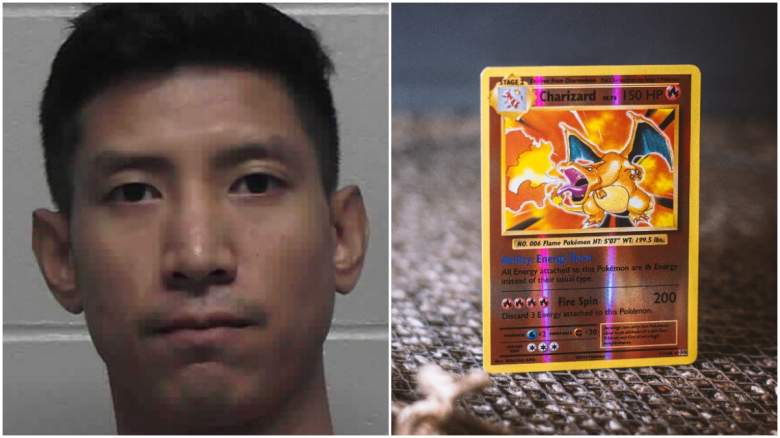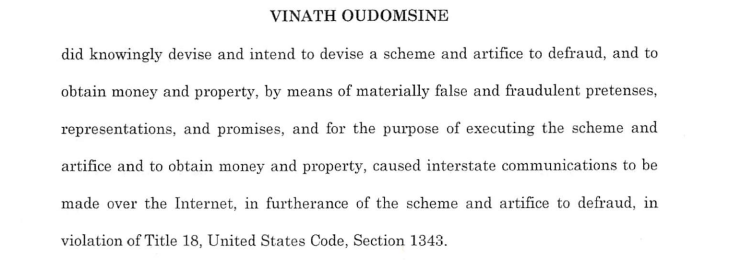
Vinath Oudomsine is the Georgia man sentenced to federal prison after investigators said fraudulently obtained a COVID-19 disaster relief loan and used the money to buy a $57,000 Pokémon card. Oudomsine admitted he lied on the loan application and pleaded guilty to one count of wire fraud.
Here’s what you need to know:
1. Oudomsine Pretended to Own a Business With 10 Employees, Investigators Said

U.S. District CourtVinath Oudomsine admitted to fraudulently obtaining COVID-19 relief funds and using the money to buy a Pokemon card.
Oudomsine applied for a COVID-19 relief loan from the Small Business Administration on July 14, 2020, according to court records filed in the Southern District of Georgia. The fund was intended to help businesses that were struggling due to the pandemic.
Oudomsine claimed to operate an “entertainment services” business in Dublin, Georgia, prosecutors said. In the application, he claimed he had 10 employees and that the business had “gross revenues of $235,000 in the 12 months preceding the COVID-19 pandemic.”
Oudomsine’s claim was approved. He received an $85,000 direct deposit into his banking account on August 4, 2020, prosecutors explained in the affidavit.
A search of Oudomsine’s name on the Georgia Corporations Division of the Secretary of State website does not bring up any business records. A separate online search of records does not bring up any businesses or professional licenses associated with Oudomsine’s name.
2. Oudomsine Spent More Than $57,000 on a Type of Rare Pokémon Trading Card That, in Other Auctions, Buyers Have Spent Hundreds of Thousands of Dollars On
Prosecutors said Oudomsine used the majority of the disaster relief loan on a collectible trading card. Oudomsine paid $57,789 on January 8, 2021, for a rare “Charizard” Pokémon card, federal officials said.
The card was a first-edition that first came out in 1999 and has an image of a dragon-like creature on it, the New York Times reported. Gamespot reported Charizard dates “back to the earliest days of the Pokemon TCG” and fans highly value the cards.
Rapper Logic bought a first-edition Charizard card for more than $220,000 in 2020, CNET reported at the time. As of this writing, a quick search on eBay for a first edition Charizard card brings up several cards for sale ranging from $2,400 to $30,000. Hypebeast also reported that a first edition Charizard card sold for $336,000 at auction in March 2022.
3. Oudomsine Had to Surrender the Charizard Card & Was Sentenced to 3 Years in Prison
Oudomsine pleaded guilty to one count of wire fraud and the Charizard card is now the property of the U.S. government. Oudomsine had to surrender the Pokémon card as part of his plea agreement with prosecutors, the Justice Department said.
Court records show a judge sentenced Oudomsine to 3 years in federal prison. Once his prison term is over, he’ll remain on supervised release for another 3 years.
He was also fined $10,000 and ordered to repay $85,000 in restitution to the Small Business Administration. The sentencing document shows that as of March 4, 2022, Oudomsine had repaid $24,745 of the restitution so far using cashier checks.
4. The U.S. Marshals Service Is Selling the Pokémon Card
The U.S. Marshals Service intended to sell the seized Charizard Pokémon card at auction, according to the New York Times. The newspaper reported the money would be held in a “seized-assets fund” and then be turned over to the Small Business Administration.
Assistant U.S. attorney Xavier A. Cunningham told the Times that Oudomsine’s case was unique. “I would say a Pokémon card is a quite novel scenario. We don’t inherently know what the market is for these cards. We had to hustle to find someone to give us a valuation for it.”
Cunningham added that someone in Oudomsine’s family handed over the card to the FBI. It had “proofs of authenticity,” the Times reported.
5. Federal Prosecutors Have Vowed to Identify Others Who Lied to Obtain COVID-19 Relief Funds
Philip Wislar, Acting Special Agent in Charge of FBI Atlanta, was quoted in the press release about Oudomsine’s prison sentence:
COVID-19 disaster relief loans are issued by the government to help businesses struggling to survive during a pandemic, not to use for trivial collectible items. This sentence highlights the FBI’s commitment to aggressively pursue anyone who would abuse taxpayer dollars and divert them from citizens who desperately need them.
In January 2022, prosecutors charged a Florida man who, they said, used COVID funds to buy a Lamborghini, Rolex watches and designer clothing, CBS News reported. In November 2021, a Texas man was sentenced to 9 years in prison after prosecutors said he had used relief funds to buy valuable vehicles, the New York Post reported.
READ NEXT: Andrew Walls: Man Accused of Punching Black Woman & Using Racial Slur in Akron Video